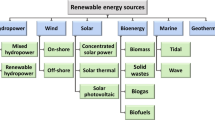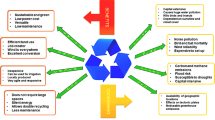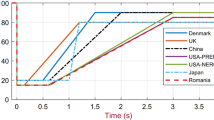Abstract
There is increasing urgency towards integration of renewable sources into electricity generation so as to minimize greenhouse gas (GHG) emissions. Renewable power sources are highly specific in prevalence, both regionally and temporally, and their utilization at utility scale for round-the-clock power supply poses the problem of matching power generation capacity and power demand at every instant of time. In the present work, we propose a model that integrates geographically distributed and diverse power sources with geographically spread-out power consumption centres and distributed and diverse electrical energy storage systems through transmission and storage loss models. For a regional electricity grid, the model computes, over a given day, the minute-by-minute power demand from and power generation in all districts, extracts matching power from a hierarchy of power sources so as to minimize transmission and storage losses, and stores/draws excess power in/from a variety of power storage options. For the specific case of the South Indian Power Grid (catering to about 285 million people in South India), the model shows that about 240 GWh of new electrical storage is required for round-the-clock power supply from non-GHG power sources.
Graphical abstract










Similar content being viewed by others
Data availability
All data generated or analysed during this study are included in this published article.
References
Barelli L, Desideri U, Ottaviano A (2015) Challenges in load balance due to renewable energy sources penetration: the possible role of energy storage technologies relative to the Italian case. Energy 93:393–405. https://doi.org/10.1016/j.energy.2015.09.057
Boddapati V, Nandikatti ASR (2020) Salient features of the national power grid and its management during an emergency: a case study in India. Energy Sustain Dev 59:170–179. https://doi.org/10.1016/j.esd.2020.10.010
Buckley T, Shah K (2019) Report entitled “pumped hydro storage in India: getting the right plans in place to achieve a lower cost low carbon electricity market” of institute for energy economics and financial Analysis, Australia, March 2019; https://ieefa.org/wp-content/uploads/2019/03/IEEFA-India_Pumped-Hydro-Storage_Mar-2019.pdf Accessed 15th Feb 2022
Çeçen M, Yavuz C, Tırmıkçı CA et al (2022) Analysis and evaluation of distributed photovoltaic generation in electrical energy production and related regulations of Turkey. Clean Techn Environ Policy. https://doi.org/10.1007/s10098-021-02247-0
David Palchak JC, Ehlen A, McBennett B, Milligan M, Chernyakhovskiy I, Deshmukh R, Abhyankar N, Soonee SK, Narasimhan SR, Joshi M, Sreedharan P (2017) GREENING THE GRID: pathways to Integrate 175 gigawatts of renewable energy into india’s electric grid, vol II—regional study. National Renewable energy laboratory, Lawrence Berkeley National Laboratory, power system operation corporation, and the United States Agency for International DevelopmentI
Dawoud SM (2021) Developing different hybrid renewable sources of residential loads as a reliable method to realize energy sustainability. Alex Eng J 60(2):2435–2445. https://doi.org/10.1016/j.aej.2020.12.024
Dong Z, Jiang D, Guo Z, Huang X (2020) Flexible control of nuclear cogeneration plants for balancing intermittent renewables. IFAC-PapersOnLine 53(2):12560–12565. https://doi.org/10.1016/j.ifacol.2020.12.1813
Flores HFV, Furubayashi T, Nakata T (2016) Decentralised electricity generation system based on local renewable energy sources in the Honduran rural residential sector. Clean Techn Environ Policy 18:883–900. https://doi.org/10.1007/s10098-015-1067-x
Golla M, Chandrasekaran K, Simon SP (2021) PV integrated universal active power filter for power quality enhancement and effective power management. Energy Sustain Dev 61:104–117. https://doi.org/10.1016/j.esd.2021.01.005
Jensen SH, Graves C, Mogensen M, Wendel C, Braun R, Hughes G, Gao Z, Barnett SA (2015) Large-scale electricity storage utilizing reversible solid oxide cells combined with underground storage of CO2 and CH4. Energy Environ Sci 8(8):2471–2479. https://doi.org/10.1039/C5EE01485A
Khoie R, Ugale K, Benefield J (2019) Renewable resources of the northern half of the United States: potential for 100% renewable electricity. Clean Techn Environ Policy 21:1809–1827. https://doi.org/10.1007/s10098-019-01751-8
Kumar A, Jayanti S (2021) A land-use-constrained, generation–transmission model for electricity generation through solar photovoltaic technology: a case study of south India. Clean Techn Environ Policy 23:2757–2774. https://doi.org/10.1007/s10098-021-02202-z
Laugs GAH, Benders RMJ, Moll HC (2020) Balancing responsibilities: Effects of growth of variable renewable energy, storage, and undue grid interaction. Energy Policy 139:111203. https://doi.org/10.1016/j.enpol.2019.111203
Liu L, Senjyu T, Kato T, Howlader AM, Mandal P, Lotfy ME (2020) Load frequency control for renewable energy sources for isolated power system by introducing large scale PV and storage battery. Energy Rep 6:1597–1603. https://doi.org/10.1016/j.egyr.2020.12.030
Mah AXY, Ho WS, Hassim MH et al (2022) Spatial optimization of photovoltaic-based hydrogen-electricity supply chain through an integrated geographical information system and mathematical modeling approach. Clean Techn Environ Policy. https://doi.org/10.1007/s10098-021-02235-4
Martin A, Agnoletti M-F, Brangier E (2020) Users in the design of hydrogen energy systems: a systematic review. Int J Hydrogen Energy. https://doi.org/10.1016/j.ijhydene.2020.02.163
Monie S, Nilsson AM, Widén J, Åberg M (2021) A residential community-level virtual power plant to balance variable renewable power generation in Sweden. Energy Convers Manag 228:113597. https://doi.org/10.1016/j.enconman.2020.113597
Nikolaidis P, Poullikkas A (2018) Cost metrics of electrical energy storage technologies in potential power system operations. Sustain Energy Technol Assess 25:43–59. https://doi.org/10.1016/j.seta.2017.12.001
Ogunjuyigbe ASO, Ayodele TR, Monyei CG (2015) An intelligent load manager for PV powered off-grid residential houses. Energy Sustain Dev 26:34–42. https://doi.org/10.1016/j.esd.2015.02.003
Oldenbroek V, Wijtzes S, Blok K, van Wijk AJM (2021) Fuel cell electric vehicles and hydrogen balancing 100 percent renewable and integrated national transportation and energy systems. Energy Convers Manag X 9:100077. https://doi.org/10.1016/j.ecmx.2021.100077
Ray A, Jana K, Assadi M et al (2018) Distributed polygeneration using local resources for an Indian village: multiobjective optimization using metaheuristic algorithm. Clean Techn Environ Policy 20:1323–1341. https://doi.org/10.1007/s10098-018-1562-y
Sarker E, Seyedmahmoudian M, Jamei E, Horan B, Stojcevski A (2020) Optimal management of home loads with renewable energy integration and demand response strategy. Energy 210:118602. https://doi.org/10.1016/j.energy.2020.118602
Tarroja B, Mueller F, Eichman JD, Samuelsen S (2012) Metrics for evaluating the impacts of intermittent renewable generation on utility load-balancing. Energy 42(1):546–562. https://doi.org/10.1016/j.energy.2012.02.040
Wang L, Zhang Y, Pérez-Fortes M, Aubin P, Lin T-E, Yang Y, Maréchal F, van herle J (2020) Reversible solid-oxide cell stack based power-to-x-to-power systems: comparison of thermodynamic performance. Appl Energy 275:115330. https://doi.org/10.1016/j.apenergy.2020.115330
Funding
The authors declare that no funds, grants, or other support were received during the preparation of this manuscript.
Author information
Authors and Affiliations
Corresponding author
Ethics declarations
Conflict of interests
The authors have no relevant financial or non-financial interests to declare.
Additional information
Publisher's Note
Springer Nature remains neutral with regard to jurisdictional claims in published maps and institutional affiliations.
Rights and permissions
Springer Nature or its licensor holds exclusive rights to this article under a publishing agreement with the author(s) or other rightsholder(s); author self-archiving of the accepted manuscript version of this article is solely governed by the terms of such publishing agreement and applicable law.
About this article
Cite this article
Kumar, A., Jayanti, S. An energy-mix model for round-the-clock power supply in a decarbonized electricity generation scenario: case study of South India. Clean Techn Environ Policy 24, 3345–3364 (2022). https://doi.org/10.1007/s10098-022-02384-0
Received:
Accepted:
Published:
Issue Date:
DOI: https://doi.org/10.1007/s10098-022-02384-0




